07 Jun National Comedy Center Becomes Home to Joan Rivers’ Career Archive Including Legendary Joke File
The New York Times: The Joan Rivers Card Catalog of Jokes Finds a Home – The New York Times (nytimes.com)
PRESS RELEASE:
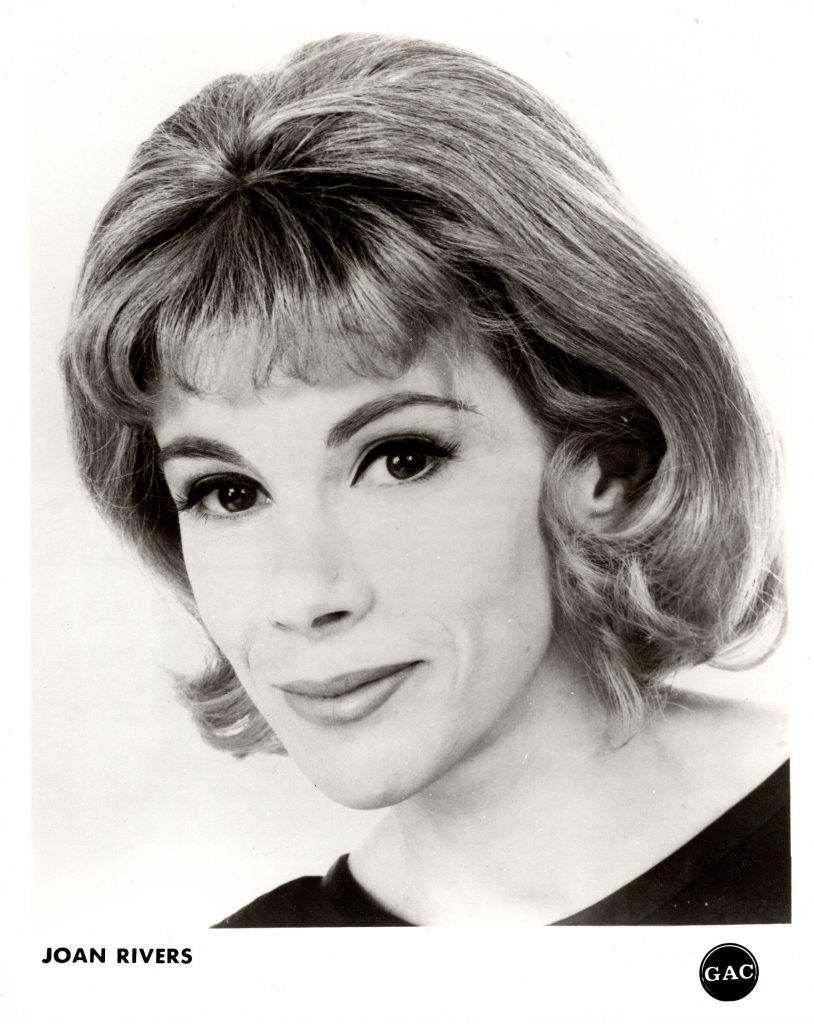 JAMESTOWN, N.Y., June 8, 2023 – On the 90th birthday of the late comedy icon Joan Rivers, her daughter Melissa Rivers announced that the National Comedy Center, the United States’ official cultural institution dedicated to the art form of comedy, will become the home of Joan Rivers’ career archive including a file cabinet containing over 65,000 original jokes spanning from the start of her career in the 1950s to 2014 when she passed away.
JAMESTOWN, N.Y., June 8, 2023 – On the 90th birthday of the late comedy icon Joan Rivers, her daughter Melissa Rivers announced that the National Comedy Center, the United States’ official cultural institution dedicated to the art form of comedy, will become the home of Joan Rivers’ career archive including a file cabinet containing over 65,000 original jokes spanning from the start of her career in the 1950s to 2014 when she passed away.
The archive thoroughly chronicles Rivers’ artistic evolution and creative process, from her emergent years navigating 1950s Greenwich Village nightclub gigs and performing at Chicago’s Second City, through her historic rise in standup comedy and on late night television, to her influential later years as an architect of reality TV.
“I am so honored that my mother’s archives will have a home at the National Comedy Center. To be included with the legends of comedy who are represented at the National Comedy Center is amazing. My mother would have been thrilled to be seated at the best table,” stated Melissa Rivers.
Highlights from the collection include Rivers’ earliest hand-written jokes, personally compiled scrapbooks, never-before-heard autobiographical audio recordings, hundreds of pre-show preparatory notes, intimate correspondence with peers in entertainment, the guest books from her storied run as host of The Late Show with Joan Rivers, and a selection of the iconic gowns, boas, and jewelry that defined her inimitable style.
“Joan Rivers was a master of evolution who ascended—again and again—to the heights of success in an industry that was not structured in her favor, blazing a wide and clear trail for generations of artists who would follow,” stated National Comedy Center Executive Director Journey Gunderson. “She is not only a role model for women in comedy, but for all artists who desire to wield comedy’s expressive power to communicate something vital about the human condition.”
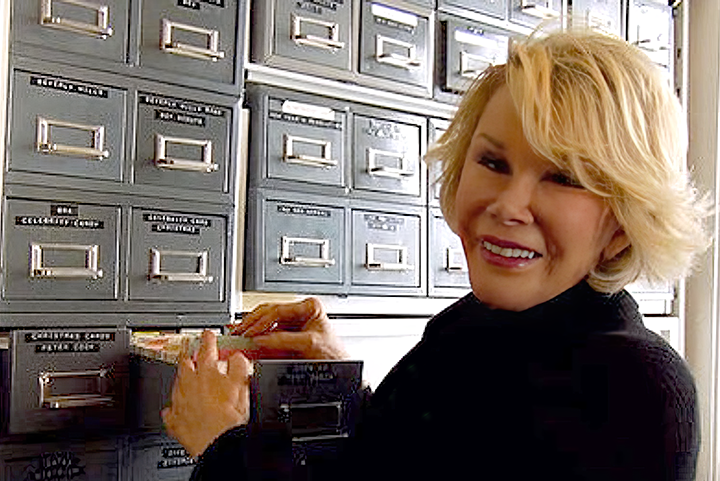
Photo credit: BREAK THRU FILMS/IFC
The National Comedy Center will debut an interactive exhibit in its galleries in Jamestown, NY in 2025, allowing museumgoers to explore the joke file. With immersive audiovisual design from the museum’s award-winning creative team, the exhibit will offer a deep dive into the artistic process of a culture-shifting innovator whose singular body of work exemplifies extraordinary craftsmanship and professional resilience.
The joke file consists of several file drawers, once installed in Rivers’ home office, meticulously arranged by subject matter. 564 jokes are filed under PARENTS HATED ME (see: NOT WANTED) and over 300 within the STEWARDESSES category. In a category called 28 AND SINGLE (see: WEDDINGS), Rivers logged: “I was left standing at the altar so long my bouquet took root!”; under EDGAR (see: MARRIAGE, HONEYMOON) she wrote: “My honeymoon was a disaster. The next day, he screamed, ‘Don’t tell me you can’t cook either;’” and in COOKING she recorded a classic line, made famous on one of her 31 Ed Sullivan Show appearances: “If the Lord wanted me to cook, I’d have aluminum hands. These hands were meant to hold charge cards.” The joke file was featured in the 2010 documentary Joan Rivers: A Piece of Work.
“Joan Rivers is among the most influential stand-up comedians in the history of the art form. Her legacy, characterized by bold truth-telling, personal vulnerability, and a raw determination to make great art, altered the trajectory of American cultural history—more than once,” stated the National Comedy Center’s Director of Archives, Dr. Laura LaPlaca.
Fellow comedians also commented on the announcement:
Comedy legend Carol Burnett stated, “Joan was one of the funniest people I ever met, and a friend for decades. It’s wonderful to know that her archives will join the National Comedy Center, a one-of-a-kind museum dreamed up by none other than Lucille Ball: a woman whom Joan and I both loved and admired very much.”
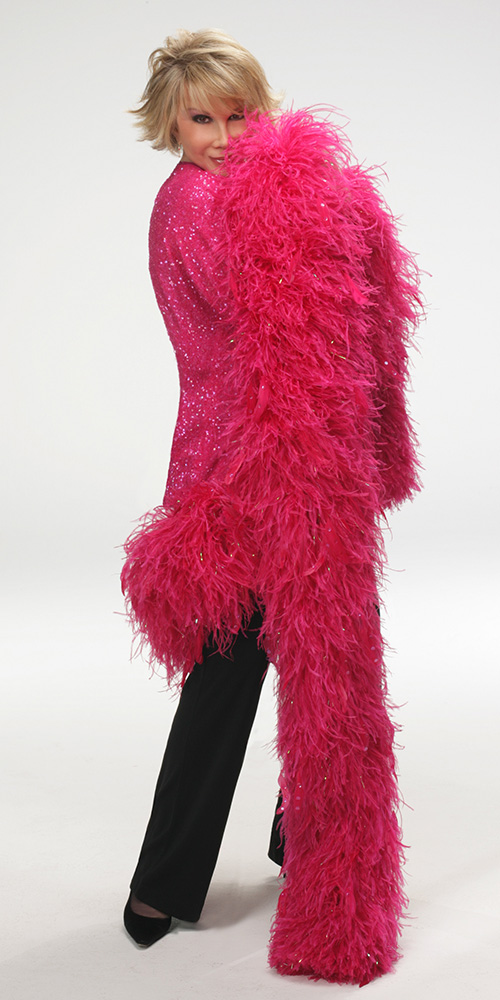
“This archive is priceless not only for the history of comedy but also for women in art. Joan was a trailblazer, an icon, a true legend,” said comedian Margaret Cho. “I was lucky enough to know her and call her a friend. To be able to see her life in jokes is a tremendous honor.”
“All of us in comedy are indebted to Joan Rivers. Her body of work is an essential part of comedy history and her full life was a model of creative resilience,” stated comedian Lewis Black, Founding Chair of the National Comedy Center Advisory Board. “I’m so glad that her archive will be preserved at the National Comedy Center, a museum that opens minds and sparks creativity by teaching us about comedy’s past. This is why it’s so important that the National Comedy Center exists – to preserve our vital comedy heritage. There is no better place for Joan’s story to live on.”
“Joan rivers was so instrumental in my personal career, but more importantly she remains an iconic trailblazer for all standup comedy. She constantly pushed the boundaries of material, platforms and gender. Just about everything we see today in comedy has a connection in some way to Joan,” stated comedian Howie Mandel.
“Joan Rivers moved the future forward when she walked into a man’s world and made room for women,” stated comedian Chelsea Handler.
“Joan Rivers was a fearless truth teller who proved that no topic is off limits – as long as you are delivering a brilliant and well-crafted joke. She accomplished many firsts for female comedians, and yet she had a major impact on comedians of all genders, races and colors. Most of all, she was utterly hilarious,” stated comedian Judy Gold.
Melissa Rivers also announced today the launch of a special edition 4-disc CD box set collection titled “Joan Rivers – The Diva Rides Again” that will feature five hours of never-before-released recordings of Joan’s comedy, including six decades worth of hilarious material and a special 16-page collector’s book of liner notes with never-before-seen photos. The box set is currently available for preorder on Amazon, Target.com and Walmart.com and will be released on August 18, 2023 on streaming platforms such as iTunes and Spotify. The set is produced and distributed by Comedy Dynamics in partnership with the Joan Rivers estate.
The National Comedy Center is the United States’ Congressionally-designated comedy archive and maintains a collection of over 150,000 individual objects, documents, and recordings chronicling the contributions of innovators like Lucille Ball & Desi Arnaz, George Carlin, The Smothers Brothers, and the creative minds behind Saturday Night Live, In Living Color, and Johnny Carson’s Tonight Show. Artifacts from the careers of dozens of artists, from Charlie Chaplin, Phyllis Diller, and Richard Pryor to Eddie Murphy, Gabriel Iglesias, and Mindy Kaling are on view in the museum’s galleries on a rotating basis.
The National Comedy Center’s advisory board members include artists like Amy Poehler, Tiffany Haddish, Jim Gaffigan, Pete Docter, Paula Poundstone, George Schlatter, W. Kamau Bell, and Lewis Black, and also included Carl Reiner (2018-2020) and George Shapiro (2018-2022). The Center is located in Lucille Ball’s hometown of Jamestown, NY and was born of Ball’s vision to establish a national-scale hub for the celebration of the comedic craft.
About Joan Rivers
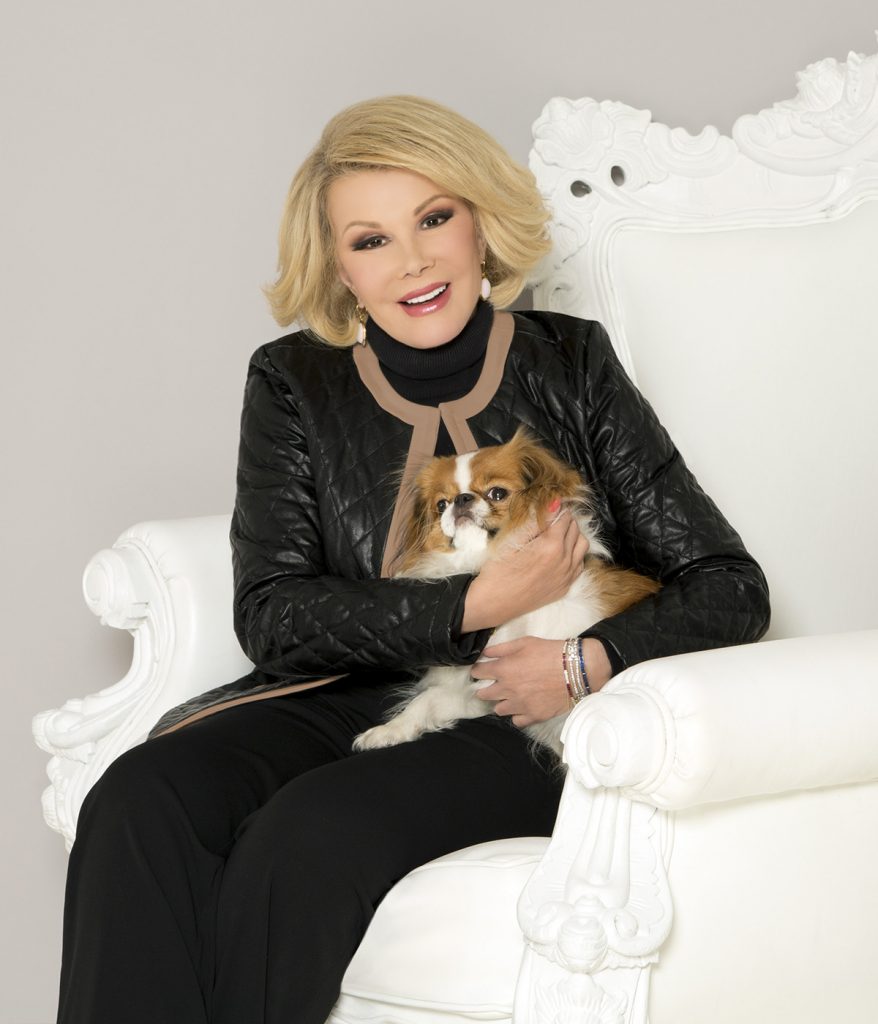
Widely respected for her savvy and her indefatigable work ethic, Joan Rivers’ career journey was, in her own words, not a choice, but a deeply felt “calling.”
By the age of eight, Joan Molinsky (a daughter of two immigrants) had already mailed a photo of herself, frame and all, to MGM Studios. Her first grade report card cited a “great interest in dramatics” and “a keen desire to succeed,” but recommended that she work on reining in her incessant talking. Rivers went on to graduate from Barnard College with dreams of a career on the stage.
She was not an overnight success. For more than ten years, Rivers plied her craft in relative obscurity. “It’s paying your dues,” she would later say, “appearing again and again and again and again on every sort of stage in front of every kind of audience, until you gradually, gradually acquire technique and a stage identity, which is not you… but has your passion, your hurts, your angers, your particular humor. It’s a birth process, and it can be very painful.”
On February 17, 1965, after a stunning performance on Johnny Carson’s Tonight Show, Joan Rivers’ life, and the trajectory of comedy history, changed forever: She burst upon the scene as a shock to America’s social order. Rivers had crafted herself into one of the most original voices of the 20th century—with a unique sound, cadence, look, and perspective that not only set her apart, but galvanized audiences that identified with her as she boldly became the first stand-up to address the intimate and profound issues facing women of her generation. She exposed and then challenged subjects ranging from body image, sex, and the pressures of dating, to childbirth, motherhood, and the taboo of questioning societal expectations to marry. In her ‘uniform’ of a little black dress and pearls, Rivers coined a confessional “over-the-back-fence” style that traded in the rhythms and cadences of gossip, punctuated with her signature phrase “Can we talk?” As she put it: “Onstage, I complain for every woman in America.”
Rivers’ every career move was tactical, and responsive to an entertainment industry that was accustomed to building boxes for women to work within; She worked tirelessly to accumulate clout in the industry, and then leveraged it masterfully to forge her own path—on her own terms: “You have to be very, very strong and push your way through, or people will shove you under. It’s survival of the fittest.”
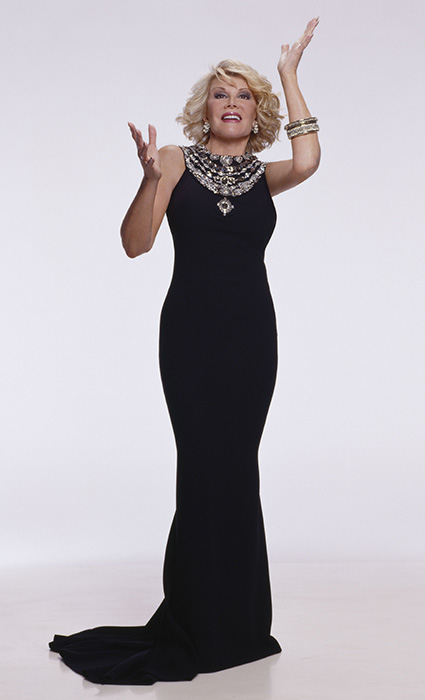 Joan Rivers married Edgar Rosenberg, a producer who had hired her to touch up a script, five days after meeting him, on July 15, 1965 (and performed two shows at the Bitter End later that night). Rosenberg was a key architect of his wife’s career and lobbied at the highest levels for her autonomy and creative control. Together they built a small industry that they referred to as “The Career”–as though it were a living, breathing third party in their lives. In 1968, Rivers and Rosenberg welcomed a daughter, Melissa. Joan appeared eight months pregnant on The Ed Sullivan Show—an extraordinary benchmark in TV history at a time when she was disallowed from using the word “pregnant” during her set due to antiquated censorship rules.
Joan Rivers married Edgar Rosenberg, a producer who had hired her to touch up a script, five days after meeting him, on July 15, 1965 (and performed two shows at the Bitter End later that night). Rosenberg was a key architect of his wife’s career and lobbied at the highest levels for her autonomy and creative control. Together they built a small industry that they referred to as “The Career”–as though it were a living, breathing third party in their lives. In 1968, Rivers and Rosenberg welcomed a daughter, Melissa. Joan appeared eight months pregnant on The Ed Sullivan Show—an extraordinary benchmark in TV history at a time when she was disallowed from using the word “pregnant” during her set due to antiquated censorship rules.
Rivers was the creative force behind Broadway’s Fun City (a play about women’s liberation) and TV’s The Girl Most Likely To… (a record-setting dark comedy about a girl struggling with traditional standards of beauty). In 1978, she became one of the first women ever to write and direct a comedy feature–Rabbit Test, a cult classic about a man (Billy Crystal) becoming pregnant.
After her legendary turn on Carson’s Tonight Show stage, Rivers ascended as the show’s permanent guest host, filling in for Johnny on more than 90 occasions. When she no longer saw a path for herself at the Tonight Show desk, Rivers made history as the first woman to land her own late night talk show, Fox’s Late Night with Joan Rivers. While seemingly at the peak of her career, Rivers suffered a devastating break with Fox, followed by her husband’s tragic suicide. Then aged 54, she found herself a single mother, indebted, and—in her estimation–“un-hireable.” She rebuilt herself, and her career, anyway: “I was damned if I was going to be destroyed.”
Rivers secured a daytime talk show—and won an Emmy; she wrote and starred in a Broadway play (Sally Marr)–and received a Tony nomination; she accelerated her stand-up career with dates at premier venues around the country; and she founded the wildly successful Joan Rivers Worldwide fashion brand. “My alternate career,” Rivers said, “has been pulling myself up from rock bottom.”
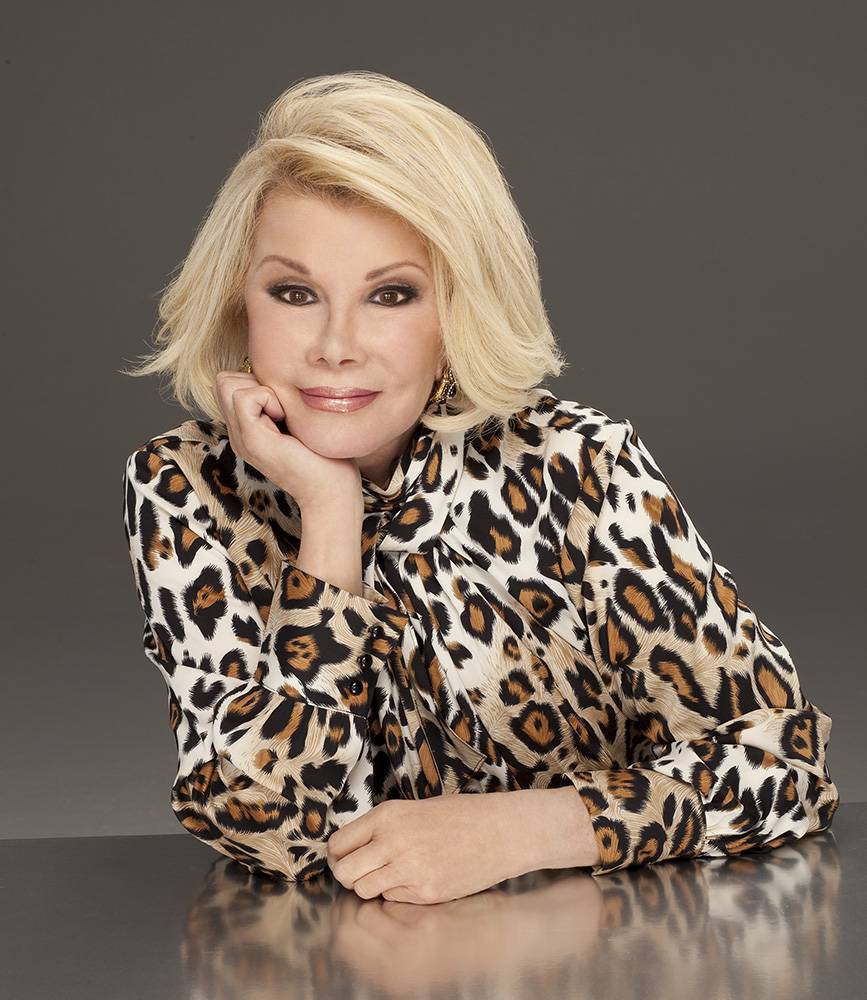 Rivers believed, deeply, that humor was a salve and a leveler—a way of diffusing enormous pain (including her own) and connecting to others in empathy. No one was ‘safe’ from her barbs, least of all herself, and everyone was welcome to laugh. Rivers was fond of reminding critics that “punching up” at those with power was an important part of public discourse, and that anyone famous enough to be the butt of a joke—with enough name recognition and cultural currency to make all of America laugh in unison—was capable of enduring friendly fire. Public figures from Dolly Parton, Yoko Ono, and Liz Taylor, to Jacqueline Kennedy Onassis, the Queen of England, and President Barack Obama were the recipients of Rivers’ humor, and most always considered this a badge of honor—filling Rivers’ files with letters of thanks and good humor. “If you are a current comic and do not offend somebody,” Rivers quipped, “you are doing itsy-bitsy cutesy-wootsie pap. If 10 percent of people hate me, I will be fine. That means I am still on the cutting edge.”
Rivers believed, deeply, that humor was a salve and a leveler—a way of diffusing enormous pain (including her own) and connecting to others in empathy. No one was ‘safe’ from her barbs, least of all herself, and everyone was welcome to laugh. Rivers was fond of reminding critics that “punching up” at those with power was an important part of public discourse, and that anyone famous enough to be the butt of a joke—with enough name recognition and cultural currency to make all of America laugh in unison—was capable of enduring friendly fire. Public figures from Dolly Parton, Yoko Ono, and Liz Taylor, to Jacqueline Kennedy Onassis, the Queen of England, and President Barack Obama were the recipients of Rivers’ humor, and most always considered this a badge of honor—filling Rivers’ files with letters of thanks and good humor. “If you are a current comic and do not offend somebody,” Rivers quipped, “you are doing itsy-bitsy cutesy-wootsie pap. If 10 percent of people hate me, I will be fine. That means I am still on the cutting edge.”
In 1996, she collaborated with her daughter, Melissa, to reinvent the tradition of the award show with E!‘s Live from the Red Carpet, which cemented her into the consciousness of still another generation of fans. A talk show (Fashion Police,) a winning turn on a top-rated reality show (Celebrity: Apprentice), a reality show of her own (Joan and Melissa: Joan Knows Best), a web series (In Bed with Joan), and a very funny Twitter account cast her as a key architect of the 21st century’s post-modern, blunt-take celebrity culture, which has become the bedrock of American entertainment for the past two decades. On February 17, 2014, Joan Rivers appeared on the premiere episode of The Tonight Show Starring Jimmy Fallon–49 years to the day after her first appearance with Johnny Carson. Rivers passed away later that year, leaving an unmatched legacy in stand-up comedy that continues to inspire and entertain.

